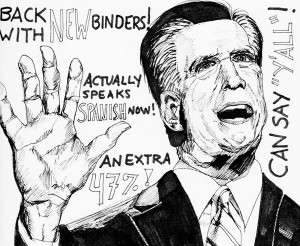Possible Romney run due to lack of voting
On Monday, former Massachusetts Gov. Mitt Romney indicated his intention to enter the 2016 presidential election. According to the Washington Post, Romney has already begun to assemble a team for his campaign. He told a senior Republican that he “almost certainly will” make a third bid for presidency.
In February 2007, Romney announced his first run for the presidency. Though optimistic, he lost his first primaries to former Arkansas Gov. Mike Huckabee and Sen. John McCain. A mere two months into his campaign, The New York Times began reporting that Romney was flip-flopping on his views and he ultimately lost the Republican nomination to McCain.
In 2011, Romney announced his second run for the presidency. He lost his first primary in Iowa to former Republican Sen. Rick Santorum, but gained momentum and eventually won the Republican nomination. His campaign was marred once again, however, by accusations from the Washington Post of his mixed stances on political issues such as illegal immigration and foreign policy, and he ultimately lost the race to President Barack Obama.
Despite his repeated losses, Romney’s continued campaign runs are not considered abnormal or excessive in terms of America’s political structure. In fact, they are par for the course for politicians on Capitol Hill. In the House and Senate, the same handful of people have been running for office interminably, like Sen. Thad Cochran who, according to the Washington Post, has been in the Senate since 1978, and Rep. John Conyers, Jr. who, according to his biography on his congressional website, has been in office since 1965. But unlike Romney, these people keep running because the American people keep voting for them. Just last year, the Center for Responsive Politics reported that a staggering 88.5 percent of all incumbents who were up for reelection were voted back into office. This is the Congress that earned itself a scant 16 percent approval rating, according to polls by Gallup.
In this way, following American politics feels a lot like going insane. Every year the American people throw the same politicians at the same problems that seem to never seem to get resolved. Though our leaders pontificate about immigration reform and gay marriage and abortion and the economy, their talking points no longer appear to translate into action. They are merely repetitive arguments. But restating campaign promises on the House and Senate floors does not create new legislation — it does little more than provide quotable material for the next campaign. When members of Congress stand fast on their every claim and refuse to communicate with the other party, they are not providing what the American people need. What we need is legislation, which means compromise, amendment, and flexibility. This means ending political gridlock. This means looking out for the betterment of one’s constituents and one’s nation, not just the betterment of one’s career.
But voters need to act too. It is not entirely the fault of our representatives that they cannot represent their people when they refuse to represent themselves. In 2014, The New York Times reported a voter turnout of 36.4 percent — the lowest it has been in 72 years. Because of these numbers, congressional leaders do not know what Americans want. People let themselves be governed by the radical minorities that speak out when we they could be speaking louder. Maybe the incumbent members of Congress would not have an almost 90 percent re-election rate if we chose to show up and vote for somebody else. Innovative solutions to our nation’s problems could be formulated if time and money were spent supporting the lobbying groups that protect our interests. Additionally, if we had a radical referendum and voted for new politicians, new ideas, new solutions, the government would again be of the people, by the people and for the people, instead of being of the politicians, by the lobbyists, and for the special interest groups.
Hopefully, the political establishment will re-evaluate its policies if we deliver it a loss filled with the rage of 300 million dissatisfied constituents. Or maybe not.
Every year, fewer of us turn out to vote. Every year, we are disheartened. Then we lower our standards. Then we don’t vote. Then we are disheartened. And on and on and on.

